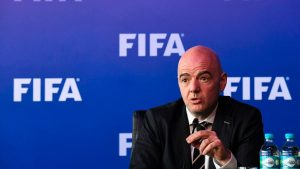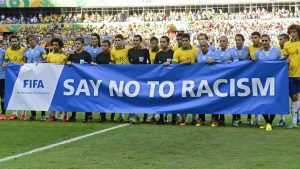By Coptic Solidarity –
The Fédération Internationale de Football Association (FIFA) has taken a strong public stance against discrimination within football through their rhetoric, governing documents, and in their Best Practices Guide. Yet, FIFA has completely failed to implement and enforce these important ideals of antidiscrimination in the case of minority football players in Egypt. Until FIFA takes actual, meaningful action—as opposed to words—to end wide-spread and well-documented discrimination, it will continue to undermine its own credibility and purpose in regulating football worldwide.

Giani Infantino, President of FIFA
FIFA’s governing statutes not only apply to the international organization, but to all of their members’ organizations, including the Egyptian Football Association (EFA). Egypt has a long history with FIFA, and first qualified to participate in a FIFA World Cup in 1934.
FIFA’s Good Practice Guide on Diversity and Anti-Discrimination was originally published in October 2015. It was updated and republished to all member organizations in June 2018. The guide is a handbook that expresses FIFA’s stance against discrimination and the promotion of diversity; it also includes examples and ideas for member organizations to combat discrimination at the national and club level.
The excellent foreword by FIFA president, Gianni Infantino, is an unequivocal statement against discrimination. He says:
Football is for all. That statement does not come from me, or FIFA: it is a defining trait of the game and that is what makes it such a powerful cultural phenomenon. FIFA’s role is to foster and safeguard this precious attribute. We are doing this by investing more funds than ever in the sport to ensure that everyone can participate in it. Investment in football development brings with it a greater social responsibility, of which diversity and anti-discrimination are an integral part. That is why FIFA is demonstrating in word and deed that discrimination has no place in football, which is spelled out clearly in article 4 of the FIFA Statutes” (emphasis added).
Since their founding, FIFA has been an international leader against discrimination. As the FIFA Good Practice Guide states:
FIFA itself also has a long tradition of promoting anti-discrimination. It was one of the first international organisations, apart from the United Nations, to lay down such rules. More specifically, art. 2 of the FIFA Statutes that were passed at the 1960 FIFA Congress in Italy read as follows: “The national federation must be open to all who play football in the country without any racial, religious or political discrimination, or discrimination by category (i.e. amateurs, non-amateurs, professionals). By approving these two principles, it is the case that only associations respecting these principles may henceforth be accepted as FIFA members” (emphasis added).
The guide continues with clear language regarding the responsibility of FIFA member organizations, such as the Egyptian Football Association (EFA), stating:
They shall respect the significance of their allegiance to FIFA, the confederations, associations, leagues and clubs, and represent them and behave towards them honestly, worthily, respectably and with integrity. They shall further respect the core value of fair play in every aspect of their functions. They shall assume social and environmental responsibility.
FIFA has an impressive track record of prioritizing issues of discrimination within football. A timeline of their proactive stances and actions are listed in the Good Practice Guide (see full list on pages 24 – 33).
Some highlights include:
Since 1960, FIFA has taken a determined stance in favour of diversity and against discrimination in its Statutes, and later in the FIFA Code of Ethics and FIFA Code of Conduct, thus laying the foundations for a respectful and peaceful coexistence in the global football family. Concrete examples include FIFA’s resolution against racism at the Extraordinary FIFA Congress in Argentina in 2001 and its resolution on the fight against racism and discrimination at the 2013 FIFA Congress in Mauritius, as well as the action plan FIFA 2.0: The Vision for the Future.
October 2004 – Creation of the Code of Ethics
On 6 October 2004, the FIFA Executive Committee approves a Code of Ethics drawn up
by the Committee for Ethics and Fair Play, amended in 2012 to read: “Article 23 – Persons bound by this Code may not offend the dignity or integrity of a country, private person or group of people through contemptuous, discriminatory or denigratory words or actions on account of race, skin colour, ethnic, national or social origin, gender, language, religion, political opinion or any other opinion, wealth, birth or any other status, sexual orientation or any other reason” (emphasis added). *
May 2015 – FIFA Anti-Discrimination Monitoring System
The FIFA Anti-Discrimination Monitoring System is presented at Wembley Stadium
before the qualifiers commence for the 2018 FIFA World Cup™.
In 2019, FIFA made a small but meaningful change to their fourth governing statue. This statute covers non-discrimination, equality and neutrality.
The 2016, statute 4.1 states:
Discrimination of any kind against a country, private person or group of people on account of race, skin colour, ethnic, national or social origin, gender, disability, language, religion, political opinion or any other opinion, wealth, birth or any other status, sexual orientation or any other reason is strictly prohibited and punishable by suspension or expulsion.
But in 2019, the statute was updated to include a second point, a broadly worded and passive provision—the purpose of which appears to be to allow FIFA to cite whenever it prefers not to enforce their anti-discrimination policy with regard to politics or religion. The new article 4.2 states:
FIFA remains neutral in matters of politics and religion. Exceptions may be made with regard to matters affected by FIFA’s statutory objectives.
FIFA rightly recognizes that it will not be able to force member organizations to combat discrimination. It instead takes the approach of providing ideas, examples, and tools to encourage member organizations to take the initiative in their own countries or clubs. The Good Practice Guide suggests:
If diversity and anti-discrimination are to be promoted in the long term, it is not always helpful to have a detailed set of measures issued from a central source. For this reason, the following guiding principle was borne in mind when creating this guide: every member association is subject to its own national laws and religions and has its own particular history and traditions. Discrimination can take many different forms and vary widely from region to region. These aspects must be considered if measures are to be effective and to reach the people at whom they are aimed. Member associations therefore face their own particular challenges when seeking to promote diversity and anti-discrimination.
One of the meaningful recommendations in the guide includes appointing a person to deal with discrimination complaints so that footballers have a local person/place to seek assistance. Another recommendation was for every member organization to draft their own plan to combat discrimination, recognizing the difference in cultures worldwide and that a one-size-fits-all approach will not be effective.
While cultural sensitivity and allowance for locals to adapt and implement policies on their own terms is ostensibly prudent, so too does it undermine the very existence of an international governing body, whose entire purpose is to set standards of fairness and equality that apply to all members—irrespective of “cultural sensitivity,” and to enforce them. It is, after all, for this very reason that FIFA maintains the right and responsibility to suspend or expel member organizations that do not follow FIFA statues, the Code of Ethics, etc. If these standards are ignored and FIFA fails to enforce them, it essentially provides incentive to other member organizations to behave as they wish and disregard the standards.
 Throughout the Good Practice Guide, FIFA refers frequently to the politically correct and popular topics of racism, sexism, homophobia, and places a big emphasis on incorporating immigrants into football activities and dispelling myths and harmful views of them. The Guide also twice refers to far- right and right-wing extremists. While these all are important aspects in promoting diversity and overcoming discrimination, virtually nothing is said about religious discrimination, which in many ways is the primary form of discrimination that proliferates in non-Western nations—for example, in the many nations that base their constitution and laws on Shari‘a, or Islamic law, which, as is well known, is inherently biased against non-Muslims in favor of Muslims. The effort to appear “politically correct” results in disenfranchisement and greater discrimination against the most vulnerable minorities, in this case, the Christian Copts of Egypt.
Throughout the Good Practice Guide, FIFA refers frequently to the politically correct and popular topics of racism, sexism, homophobia, and places a big emphasis on incorporating immigrants into football activities and dispelling myths and harmful views of them. The Guide also twice refers to far- right and right-wing extremists. While these all are important aspects in promoting diversity and overcoming discrimination, virtually nothing is said about religious discrimination, which in many ways is the primary form of discrimination that proliferates in non-Western nations—for example, in the many nations that base their constitution and laws on Shari‘a, or Islamic law, which, as is well known, is inherently biased against non-Muslims in favor of Muslims. The effort to appear “politically correct” results in disenfranchisement and greater discrimination against the most vulnerable minorities, in this case, the Christian Copts of Egypt.
In August 2016, Coptic Solidarity (CS) sent an insured letter to FIFA, notifying them of the systematic discrimination Coptic footballers experience in Egypt. The letter asked FIFA to conduct a thorough and independent investigation. At first, these efforts were met with silence. When several European news outlets began to publish Coptic Solidarity’s request for an investigation and publishing articles about individual Coptic footballers who had experienced discrimination, FIFA finally contacted Coptic Solidarity (20 months later) requesting more information.
Coptic Solidarity board member, Mr. Magdi Khalil, issued a call for Coptic footballers who had experienced discrimination, or had personal knowledge of cases to submit information of those cases to him. Despite the very real risk of reprisal from Egyptian internal security forces, many Coptic footballers came forward and shared their experiences of religious discrimination in Egypt.
Coptic Solidarity published the report, Discrimination Against Copts in Egyptian Sport Clubs, that Mr. Khalil wrote on behalf of the NGO. On June 17, 2018, Coptic Solidarity emailed the report directly to several FIFA staff members and submitted it via the FIFA online complaints mechanism. Some of the most important findings of the report as Coptic Solidarity noted in a recent press release follow:
The Egyptian Olympic Mission to Brazil in 2016 was completely devoid of Copts; same too the Egyptian National Team at the 2018 World Cup in Russia. Not a single Copt can be found on either the main team or the reserve. There are currently 540 players in the top-flight soccer clubs in Egypt; only one is a Copt—despite the fact that Copts comprise at least ten percent of Egypt’s population. During the past half-century, an infinitesimally tiny number of Coptic footballers – at most six – have managed to join top flight soccer clubs.
To date, this is still the only thorough report available regarding discrimination against Coptic athletes that has been produced as proof for FIFA.
The report included ample sources and testimonies by moderate Muslims corroborating the reality of discrimination against Coptic athletes. It also included 25 of the cases reported to Coptic Solidarity by Coptic footballers. Of note, Mr. Khalil has continued to receive numerous reports of discrimination from Coptic Footballers since the report was published.
On October 30, 2018, Coptic Solidarity followed up with FIFA regarding the submitted report and received no reply. In preparation for a new campaign to draw attention to FIFA’s lack of action, Coptic Solidarity staff discovered the aforementioned change to their statue regarding discrimination.
It appears no coincidence that Coptic Solidarity was finally able to secure a conference call with FIFA in August 2019, after this change had been made. While an initial discussion was held, much more is required, including starting an independent investigation and ensuring that the temporary Normalisation Committee in Egypt (which is running the EFA after the former members were all dismissed due to corruption) fulfills its role in ending discrimination against Coptic footballers.
International bodies, especially those who have made many public commitments to upholding human rights, fighting discrimination, and promoting diversity, have a responsibility to behave equitably and not chose which incidents of discrimination they will and will not represent. It may be more “politically correct” to identify and call out discrimination by right wing extremists, but the fact is, many more athletes around the world are suffering from other forms of discrimination—some of which is not politically correct to cite. In the end, individual human rights and dignity do not have caveats, and FIFA should not pick favorites, winners, or show preference.
What will it take for FIFA to translate their commitment to anti-discrimination into effective action?
End Note
*The Code of Ethics has undergone several revisions since being introduced in 2004
_________________________
Main Photo Credit: Midfield Press
Other photos published by FIFA





